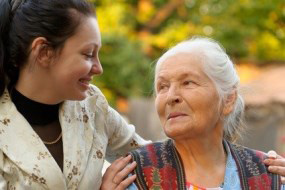
Normal aging or dementia?
Uh-oh…one of your senior relatives is starting to forget things: Where they put the car keys. The name of that restaurant they used to love. The actor in the movie they saw last week. Are these “senior moments”, early signs of Alzheimer’s disease or just normal aging?
Alzheimer’s disease is the second most feared disease following cancer. As an aging society, it’s something we think about and worry about a lot. In reality, most people don’t know the difference between Alzheimer’s disease and normal aging. Even caregivers have confusion about dementia vs. normal aging, which may result in delay of proper diagnosis and early treatment for a loved one.
Red flags should prompt a doctor visit
Here are examples of normal aging versus warning signs that would indicate a need for medical help:
- Forgetting to pay a bill vs. forgetting how to pay a bill
- Trouble finding a word or a name vs. trouble conducting a conversation or recognizing familiar people
- Forgetting a phone number vs. forgetting how to use the phone
- Losing track of the date vs. losing track of dates, seasons and the passage of time
- Gaining a few pounds vs. losing interest in or forgetting to groom
- Making a bad decision vs. progressive deterioration in judgment and decision making

Some memory loss is normal, but memory loss that disrupts daily living is not. The Alzheimer’s Association is a good resource to learn more about early signs and symptoms. If you or a loved one experiences symptoms, it is important to visit a doctor to discuss these concerns.
There may be other reasons for memory loss such as drug interactions, thyroid problems, vitamin deficiencies, depression, diet, or other causes, which is why proper diagnosis is important.
Experts say that even if you or a loved one have a genetic predisposition to Alzheimer’s, you can lower your risk by exercising, losing weight, eating well, and managing medical conditions like diabetes and stress. AARP says keeping active and fit, engaging in exercise, including weight-bearing exercises, keeping your mind active, seeking out new skills and challenges, having goals and keeping socially active are ways to “age-proof” your brain. Healthy eating and good sleep patterns can also lower your risk.
Your EAP can help too. We have numerous resources for caregivers to help with everything from caring for an aging parent to coping with Alzheimer’s.
1.800.252.4555 or 1.800.225.2527
View more newsletters at www.theEAP.com
